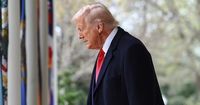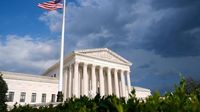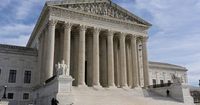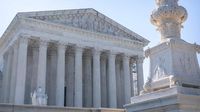The U.S. Supreme Court has decided to hear oral arguments regarding President Donald Trump’s controversial executive order aimed at ending birthright citizenship, a right that has been enshrined in the Constitution for over a century. The court's announcement on April 17, 2025, confirmed that arguments will take place on May 15, 2025, as the nation watches closely how this pivotal case will unfold.
Trump's executive order, signed on his first day back in office in January 2025, seeks to deny U.S. citizenship to children born in the country if their parents are in the U.S. illegally or are present on a temporary basis. This order has been met with significant legal opposition, resulting in three federal district courts blocking its implementation nationwide. The courts have ruled against the administration, stating that the executive order contradicts the Constitution's 14th Amendment, which guarantees citizenship to all persons born or naturalized in the United States.
In response to the nationwide injunctions, the Trump administration has requested the Supreme Court to allow the order to be enforced in a limited capacity while the legal battles continue. Specifically, they are asking the court to narrow the scope of the injunctions imposed by the lower courts, which currently prevent the enforcement of the order across the entire country.
As the Supreme Court prepares to hear the case, various stakeholders are voicing their concerns. Critics of the executive order argue that it undermines a fundamental constitutional right that has been recognized for more than 125 years. They point to the historical context of the 14th Amendment, which was ratified shortly after the Civil War to ensure citizenship rights for all individuals born on U.S. soil.
Among those challenging the order is a coalition of states, including Maryland, Massachusetts, and Washington, which have argued that the executive order poses a significant risk of stripping citizenship from hundreds of thousands of American-born children. They assert that this action could lead to a situation where these children are rendered stateless and subject to deportation from birth.
In a statement, U.S. District Judge Deborah Boardman, who blocked the order in Maryland, emphasized that no court in the country has ever endorsed Trump's interpretation of the Citizenship Clause of the 14th Amendment. She stated, "This court will not be the first," highlighting the overwhelming legal consensus against the administration's stance.
The Trump administration, however, contends that the courts have overstepped their authority in issuing nationwide injunctions. Acting Solicitor General Sarah Harris, in court filings, characterized the request to pause the injunctions as a "modest request." She argued that the universal injunctions prevent the executive branch from executing its policies and impede the administration's ability to address what Trump has labeled a "crisis" at the U.S.-Mexico border.
Harris further claimed that the current legal framework has created an incentive for illegal immigration, as it allows children born to undocumented parents the prospect of citizenship. This perspective is part of a broader narrative promoted by Trump and his supporters, who have long criticized what they refer to as "activist judges" for hindering their policy agenda.
As the legal debate intensifies, many observers are keenly aware of the historical implications of this case. The 14th Amendment was designed to ensure that all individuals born in the U.S. are granted citizenship, a principle that has been upheld in landmark Supreme Court cases, including Wong Kim Ark in 1898, which confirmed that birthright citizenship applies to nearly all individuals born on U.S. soil.
The Supreme Court's decision to hear this case marks a significant moment in the ongoing discussion surrounding immigration and citizenship in the United States. As the court prepares for arguments, both sides are preparing to present their cases, with the potential for a ruling that could reshape the understanding of citizenship for future generations.
In the lead-up to the May 15 hearing, legal experts and political analysts are weighing in on the potential outcomes and their ramifications. A ruling in favor of the Trump administration could pave the way for significant changes to immigration policy, while a decision against it would reaffirm the long-standing interpretation of the 14th Amendment.
The upcoming arguments will not only focus on the legality of the executive order itself but also on whether the courts have the authority to impose such sweeping nationwide injunctions. The Supreme Court's decision, expected by late June or early July, could have profound implications for the future of birthright citizenship in America.
As the nation awaits the Supreme Court's ruling, the debate over birthright citizenship continues to evoke strong emotions and opinions from all sides. Advocates for immigrants' rights argue that citizenship should not be contingent upon the legal status of a child's parents, while proponents of stricter immigration policies assert the need for reform to address what they see as a broken system.
In the coming weeks, the legal community and the public will be closely monitoring how the Supreme Court navigates this contentious issue, which sits at the intersection of immigration policy, constitutional law, and the fundamental rights of individuals born in the United States.










